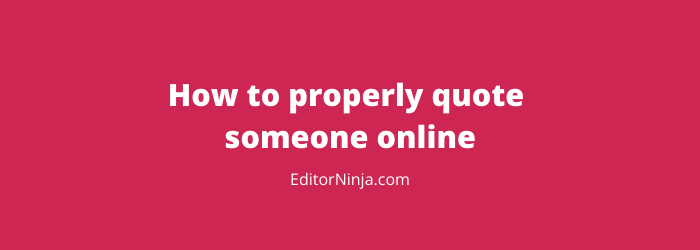As a content creator, you’re likely quoting others in the course of your work. And after all, why wouldn’t you? There are so many experts out there in the world and leveraging their expertise will only make your own work even better.
It should go without saying though that you should make it known that you are quoting them and then properly credit them with the quote where possible.
So how do you property quote someone in your own writing so as to give them credit?
There are two main things to think about when quoting someone:
- The proper grammar for quoting someone
- The proper way to give them attribution

Proper grammar for quoting someone
There are two types of quotes that you should be aware of, as they also require different grammar.
The first and most common type of quotation is a direct quote, which uses quotation marks and is meant to be (unless otherwise noted) the exact words that the person said.
Here is an example of a direct quote:
Mark told June “I love you, but the salmon are running and I need to go to Alaska for a few weeks.”
This is a direct retelling of the exact words that Mark said to June and quotations are used around the words of the direct quote. Proper grammar for a direct quote is to include the period inside the ending quotation mark unless the sentence continues. If a comma is needed to break up the sentence, that is also included inside the closing quotation before continuing.
The other type of quotation one often sees is an indirect quote, which reports what the speaker said but does not report them exactly as said.
Here is an example of an indirect quote:
Mark told June that he loves her, but that the salmon are running and he needed to go to Alaska for a few weeks.
Indirect quotes report what was said but not the exact words and thus do not need quotation marks.
Proper attribution of a quote
Properly attributing a quote to someone is both an art and a science, and it differs whether you’re attributing a quote in a whitepaper or attributing it in a blog post.
On the Internet, proper attribution is most often given in the form of a link back to their website. For example:
Marcus Aurelius once said “You have power over your mind – not outside events. Realize this, and you will find strength.”
Source (as a link to where you found it)
Something to watch out for when attributing content on the Internet is that you attribute it to the original source, not just the source where you found it, if possible. Marcus Aurelius died in 180 AD, so obviously it did not originate on the Internet and thus you cannot just cite the original. You could also cite the original source, his Meditations, where the reader could also buy it (such as Amazon). While not perfect, this is a good way to give proper attribution via a backlink and help the reader at the same time.
How Citations and Attribution Differ
It is important to recognize that citations and attributions are not the same thing.
According to OpenTextBC.com, a citation is:
“…a common and long-time practice among scholars used to indicate where a resource is from and who the author is. Unlike an attribution, citation is typically used for copyrighted works with restricted rights or “all rights reserved.” In other words, it is used in works for which broad permissions have not been granted.”
This is different from providing attribution, which the same source describes as:
“…the cornerstone condition when using a resource or text released with an open-copyright licence. This legal requirement states that users must attribute — give credit — to the creator of the work.”
To put it succinctly, you need to cite a copyrighted work and you give attribution to something published under an open-copyright license. Most content published on the Internet is under an open-copyright, so you need to attribute the source when you directly quote someone else’s work.
